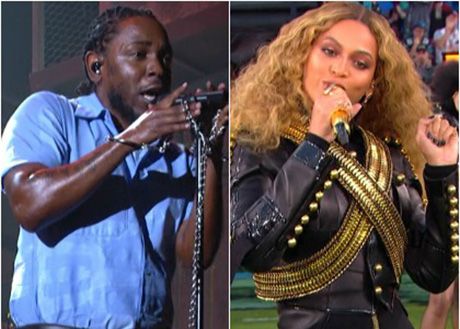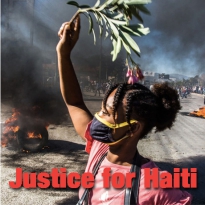News
You are here
Beyoncé and Kendrick: Radical in non-Radical places

March 2, 2016
Black Lives Matter took centre stage at two of the biggest entertainment events in the world this past month. Beyoncé and Kendrick Lamar brought the politics of Black liberation to the Super Bowl halftime show and the Grammy Awards respectively.
Beyoncé performed her new song “Formation” in an outfit inspired by Michael Jackson’s Super Bowl performance and surrounded by an army of female back-up dancers in Black Panthers outfits and natural hairdos, ending with one dancer holding a sign reading “Justice for Mario Woods,” a Black man killed by San Francisco police. Kendrick Lamar came out marching in formation as part of a chain gang with many other Black men dressed as inmates, surrounded by jail cells, to perform his song “The Blacker the Berry,” before going into a performance of two other songs, finished with the striking image of a silhouette of Africa with “Compton” printed over it.
Beyoncé’s “Formation” has lyrics like “I like my baby heir with baby hair and afros, I like my negro nose with Jackson Five nostrils” and the video features police and graffiti that reads “stop shooting us” and scenes that recall the neglect that met New Orleans after Hurricane Katrina. Kendrick Lamar’s “the Blacker the Berry” features lyrics referencing riots against police violence in Watts, Maryland, Louisville and beyond, lines that ponder the hypocrisy of a country in which he can be rich and famous but Black people can be killed so often and so callously, and a hook from Dancehall artist Assassin which goes “I said they treat me like a slave, cah’ me black/ we feel a whole heap of pain, cah’ we black/ And man a say they put me inna chains, cah’ we black/ Imagine now, big gold chains full of rocks/ How you no see the whip, left scars pon’ me back/ But now we have a big whip parked pon’ the block” It is worth taking a look at the lyrics, because they are rich and have far too much depth to be done justice by snippets in this article:
Both performances were met with celebration from all over the world. Beyoncé was hailed for dominating the show from the minute she stepped on to the field, propelling Black America onto the centre stage in the biggest sporting event in North America, injecting a hint of radical politics into an event typically festooned in nationalistic and militaristic colours. This was especially powerful in a year where the quarterback of one of the Super Bowl teams, Cam Newton of the Carolina Panthers, was disparaged for the now painfully familiar criticisms lobbed at famous Black celebrities (for example, being too “loud,” “flashy” or “arrogant.”)
Kendrick Lamar’s performance came on a night where his album To Pimp A Butterfly took home four awards before the show began and picked up another award for Best Rap Album at the beginning of the show. The medley of tunes put a spotlight on the mass incarceration of the New Jim Crow in America and, like Beyoncé, was similarly praised for its portrayal of the modern realities of Black life in America.
Backlash
However, only Beyoncé faced a significant public backlash. She was very publicly criticized for “inserting race into her performance,” a Tennessee sheriff blamed her for a rise in violence and Police federations and supporters around the country called for boycotts and protests—including from Toronto city councillor Jim Karygiannis. While Kendrick Lamar, as a rapper from Compton, seemed to be expected to give a very “controversial,” “shocking” and “Black” performance, Beyoncé, a much bigger star popular across many genres, broke out of middle American respectability and civility with an explicitly politicized performance of a song with lyrics that proudly assert her Blackness, dancers that formed a (Malcolm) X in the uniforms of a revolutionary black socialist group from the 1960s. This transgression was brilliantly exemplified in the Saturday Night Live skit “The Day Beyoncé turned Black” which features a nation of white people thrown into despair because their beloved pop icon has strongly affirmed that Black Lives Matter.
Beyoncé also faced a backlash from some progressives who claimed she had appropriated the movement, criticisms were not levelled as Lamar. As Janaya Khan, organizer with Black Lives Matter-Toronto, responded, “Most, however, went straight to attacking her in a way that is reserved only for Black women. I watched the internet unfold as Beyonce was condemned, largely by men, who felt that her packaging of Black militancy was wrong, her choice of platform was wrong, having all those Black women dressed as they were was wrong, her brand of revolutionary was wrong, a brand that she has never sought out. The issue isn’t whether or not Beyonce upholds the ideals of capitalism, we already know that she does, but rather the rampant misogynoir that was couched in social justice rhetoric under the guise of ‘checking’ or holding her accountable.”
Despite the backlash, Beyoncé’s 39-date tour is headed toward a sold-out run and one of the hottest tours of 2016. Since the performance, Beyoncé has launched a fund to help children affected by Flint’s water crisis. The power of both performances reflects both the oppression of Black people in America and the strength of the growing resistance to police brutality and systemic racism.
As Black Lives Matter co-founder Alicia Garza wrote, “even with the criticisms — some of which I agree with — we as a movement should celebrate that we have helped organize arguably one of the most iconic celebrities in the world to use her extensive platform to celebrate black resistance, to place herself in history as one who is resisting, and who puts her money where her mouth is. It's not perfect, but none of us are. Go 'head, Queen Bey. Welcome to the movement.”
Section:
Topics:










